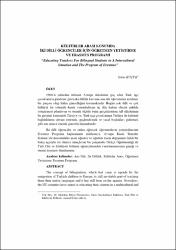Kültürler Arası Konumda İki Dilli Öğrenciler İçin Öğretmen Yetiştirme ve Erasmus Programı
Özet
1960’lı yıllardan itibaren Avrupa ülkelerine göç eden Türk işçi
çocuklarıyla gündeme gelen iki dillilik kavramı ana dili öğretiminin ayrılmaz
bir parçası olup hâlen güncelliğini korumaktadır. Bugün çok dilli ve çok
kültürlü bir ortamda kendi vatandaşlarını üç dile hakim olacak şekilde
yetiştirmeyi planlayan ve önemli ölçüde bunu gerçekleştiren AB ülkelerinin
bu girişimi karşısında Türkiye’ye, Türk işçi çocuklarının Türkiye ile kültürel
bağlılıklarını devam ettirmek, güçlendirmek ve yasal boşlukları gidermek
gibi son derece önemli görevler düşmektedir.
İki dilli öğrenciler ve onları eğitecek öğretmenlerin yetiştirilmesini
Erasmus Programı kapsamında irdelemeyi, Avrupa Kredi Transfer
Sistemi’yle üniversiteler arası öğrenci ve öğretim üyesi değişimini farklı bir
bakış açısıyla ele almayı amaçlayan bu çalışmada Türkçe Öğretmenliği ile
Türk Dili ve Edebiyatı bölümü öğrencilerinden yararlanılmasının gereği ve
önemi üzerinde durulmuştur. The concept of bilingualism, which had came to agenda by the
emigration of Turkish children to Europe, is still inevitable part of teaching
them their native languages and it has still been on the agenda. Nowadays,
the EU countries have aimed at educating their citizens in a multicultural and multilingual environment and have planned to teach them three languages at
least and they have achieved their this goal to a large extent. Having seen
this so-called enterprise of EU countries, Turkey has had significant roles
such as taking care of the children of Turkish workers, maintaining and
strengthening their cultural ties with Turkey and remove the loopholes.
The aim of this study is to scrutinize the education of bilingual
students and the teachers of them at the concept of Erasmus, evaluate this
social problem from a different angle of sight and exchange students and
lecturers among the universities by means of the European Credit Transfer
System (ECTS). Meanwhile, the need and importance of benefiting from the
students attending the departments of Turkish language and Literature has
been emphasized.
Cilt
8Sayı
1Bağlantı
http://hdl.handle.net/11630/3594Koleksiyonlar
- Cilt 8 : Sayı 1 [15]



















